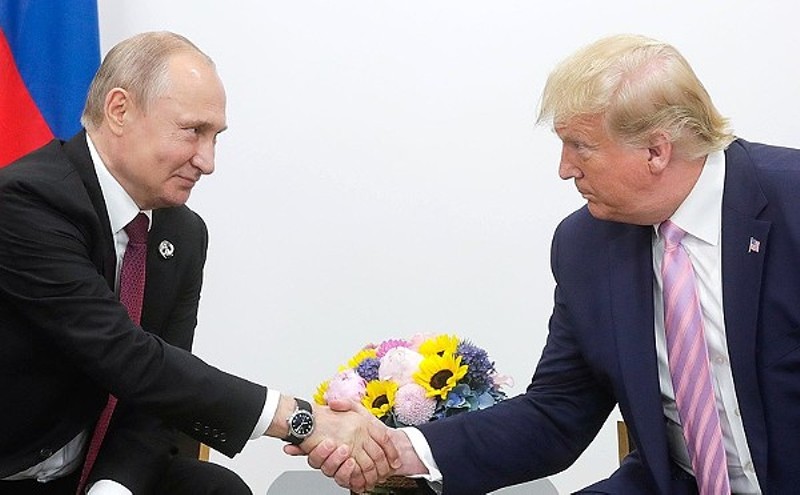Faced with an election loss, Trump will sow doubt about the truth. We can’t let that happen.
[
{
"name": "GPT - Leaderboard - Inline - Content",
"component": "35519556",
"insertPoint": "5th",
"startingPoint": "3",
"requiredCountToDisplay": "3",
"maxInsertions": 100
}
]
I was a staffer on George W. Bush’s 2000 campaign, and I experienced first-hand the chaotic uncertainty and political maneuvering that was the Florida recount. As historically bad as that time was for our country, it pales in comparison to what may be to come if vote counts on November 3 are at all close.
The Atlantic recently published Barton Gellman’s article “The Election That Could Break America,” a must-read for every concerned American. The piece explains in detail just how unequipped our Constitution, laws, and procedures are for a scenario in which there is no clear winner, or in which a sitting president refuses to concede and challenges the integrity of the election.
The picture it paints is appropriately alarming.
When we think about the basic idea of an election, we take for granted that there will be something tangible called “the results,” and that those results will provide clear truth in answer to the question “who won?” Ideally, this answer becomes clear on election night, but that’s not always the case. State laws vary as to how mail-in and provisional ballots are processed. Most states aren’t allowed to start counting those ballots until Election Day itself, and the overtime count of remaining ballots can take days or weeks. That count can change the course of an election, as it did in the 2018 Arizona Senate race, where Republican Martha McSally saw her 15,403-vote election day lead vanish as Democrat Kyrsten Sinema gained 71,303 votes in the overtime count to win by 2.4%. Due to the pandemic, we can expect unprecedented numbers of mail-in ballots, with resulting logistical troubles from the untested systems rushed into place to process them.
Here’s the problem: The more mail-in ballots, the longer the overtime count will take, and the longer the count takes, the longer we have to wait to learn who won. Let’s call this the “waiting period.” As best demonstrated by the 2000 Florida recount, the waiting period opens up numerous avenues for challenging both ballots and counting procedures, such that it quickly turns into a legal circus. To make matters worse, there will possibly be outcome-determining overtime counts in multiple battleground states, each with their own specific complications, which will amplify a national sense of confusion and uncertainty. Massive protests will likely accompany.
Gellman’s Atlantic piece details how various scenarios may unfold through key milestones: the deadline for the states to appoint their Presidential Electors on December 8, the Electoral College vote on December 14, the certification of the Electoral College vote before Congress on January 6, and ultimately, the swearing-in of a new president on January 20.
And here’s an even bigger problem: In the age of weaponized online propaganda, the longer the waiting period, the more time bad actors have to use proven, industrialized propaganda techniques to cast doubt on the very validity of the results. As the overtime count rolls on, it may become harder and harder to answer who won with a clear, widely accepted and hard-to-refute truth — one up to the task of grounding the peaceful transition of power.
Though lawyers and demonstrators will be fighting to protect the overtime count itself, a deeper battle could unfold in the public mind over what the “true” results really are. If that battle is lost, it threatens to undermine efforts to protect overtime counts in key states.
Now, here’s the biggest problem of all: Team Trump has already telegraphed countless times that attacking the validity of the results is its strategy. What’s more, it’s been a remarkably successful strategy for the administration so far. During the first debate, Trump publicly and affirmatively erased any doubt that this is the plan, even saying that he expected the results to take “months.”
When you know you can’t win — and arguably aren’t even campaigning to win — there are two options. You can redefine the rules of the game (i.e., redefine the results) to mean, for instance, only votes counted on election night. You can do this so loudly and frequently that you hope people forget it ever meant anything else, as Trump is already doing. Failing at that, you can muddy the issue and cause so much confusion that the American people, in sufficient numbers, won’t feel like they know who won.
Team Trump can then use the ensuing chaos to turn what will be a rapidly unfolding constitutional crisis into a chicken match with the Democrats: either let Trump retain power, or the country will be ripped apart. When confronted with such chicken matches in the past, albeit with lesser stakes, the Democrats have usually been the ones to swerve.
‘Firehose of falsehood’
The second must-read for understanding the Team Trump playbook is a recent piece by national security think tank the RAND Corporation, which discusses the “firehose of falsehood” Russian propaganda model. The titular Russian link is beside the point. What marked an industrial revolution in propaganda during the 2016 election is now old hat for a certain class of political operatives across the globe. Whether calculatingly or instinctively, the Trump administration fully appreciates the power of this industrialized propaganda, and it has deployed these tactics in the past on a massive scale. In summary, the RAND analysis provides big-picture context for what Team Trump has, is, and will continue to do to redefine the 2020 election. The president’s personality and rhetoric, amplified by industrialized propaganda, threatens to turn the overtime count into a perfect storm.
Industrialized propaganda plays out within the battlefield of the public mind. The RAND analysis emphasizes that this form of propaganda is so effective, in large part, because it takes advantage of the fact that first impressions and resulting beliefs are extremely psychologically resilient, especially when frequently reinforced by information sources and social groups people identify with. Like an army seizing the high ground, this gives tremendous advantage to whomever is first to claim and define an issue.
Consider how Team Trump has and continues to constantly frame mail-in ballots — and more recently, the 2020 election itself — as being “fraudulent.” Trump was out the gate in 2017 with astonishing claims of voter fraud in an election he’d just won, as if doing troop maneuvers to establish a foothold for “voter fraud” in the public mind. Team Trump has gone on to reinforce this messaging countless times, including through tweets such as this about the 2018 Florida election: “an honest vote count is no longer possible — ballots massively infected. Must go with Election Night.”
The RAND analysis further emphasizes that industrialized propaganda is neither committed to nor restrained by objective reality and consistency. Lacking these restraints, it’s more agile than messaging dedicated to facts and accuracy. Social media makes the famous Terry Pratchett quote all too literal: “A lie can run round the world before the truth has got its boots on.”
Psychological vulnerabilities
Through the modern media environment, propaganda has evolved to maximally prey upon our psychological vulnerabilities. It’s become multichannel, transmitted through a variety of formats and mediums. This allows Team Trump to expose a massive number of people to its messaging nearly instantly, many of whom pick it up and repeat it to others online or in person. Studies show that people are more likely to believe something if they hear it from multiple sources in varied formats. Research also shows that the number of arguments can matter more than the quality of argument, especially among people who are “low information” on an issue.
The everywhere-at-once media environment makes it so that people can’t put their finger on exactly where they heard something — a factor that leaves people more likely to maintain, and not seek to revise, false beliefs.
What’s worse, as the RAND analysis notes, the modern media environment allows propaganda to be “rapid, continuous and repetitive.” The well-documented “illusory truth effect” demonstrates that people are more likely to believe something the more they hear it, sometimes without any conscious reflection upon having formed a new belief. Repetition leads to a feeling of familiarity, and that feeling can overpower rationality.
These effects are worse when an issue is especially noisy with disagreement, as the overtime count will certainly be. High volume around a contentious issue overwhelms attention, and when overwhelmed, people are more likely to fall prey to psychological processes that make them much more susceptible to false information. When the public is so psychologically overwhelmed regarding an issue to the point that they don’t know what to think, they can lose the will to resist. Recognizing this important fact and how to manufacture it is a pivotal factor in how Putin was able to establish himself as an autocrat. He waged war on the very idea of reliable truth in his country — and won.
Parade of scenarios
This is just the tip of the iceberg when it comes to the power of industrialized propaganda, but it’s enough to illuminate the Team Trump plan. Trump is already redefining the results to create two classes of ballots — Election Day ballots (good) and everything counted after (fraudulent, fake, bad). This division doesn’t need to be grounded in fact; it can merely be a conditioned association. Consider the effective right-wing messaging around the term “Benghazi,” which operates by associating general negative emotion rather than by specifying factual content.
For the plan to work, Team Trump first needs the “good” Election Day ballots to contain a disproportionate amount of his votes. If Trump garners a high enough percentage of in-person ballots, he can preemptively declare victory on election night and thereby reap the psychological benefits of being the first mover to claim that the results make him the winner. Even if he isn’t obviously ahead, if he is close enough for there to be doubt, it could suffice for their plan.
The Trump propaganda arm will then go into overdrive, inundating the public with a firehose of falsehoods and messaging built upon the foothold it’s already established: that mail-in ballots have all sorts of problems and the overtime count can’t be trusted. We should expect a parade of wild scenarios, running the gamut from purported photos and videos of Democrats destroying ballots to poll workers changing votes to China planting thousands of fake ballots in the mail. The propagandists will make and repeat the claims, and the more pervasive they start to seem, the more likely they will come to “feel” somewhat correct to the less tuned-in American public.
Trump and his enablers were successful with a version of this on the Mueller report. Attorney General William Barr got ahead of the report’s release via his “summary” that had little regard for consistency or truth, and the propaganda machine did the rest. By the time the truth trickled out, it no longer mattered. What’s so concerning now is that it’s hard to imagine a more perfect scenario than the waiting period for industrialized propaganda-generated chaos to be at its most effective.
How do we respond?
Team Trump is practically shouting that this is their plan. So what can we do about it?
First, the RAND propaganda experts warn “don’t expect to counter the firehose of falsehood with the squirt gun of truth.” The specific legal and political fights to maintain the integrity of the overtime count are critical, but they are only one front of the ensuing conflict. Equally important is fighting to protect the concept of the results in the public mind.
The best way to counter this style of propaganda is to expose it and get ahead of it. To protect the public mind, we must shout from the rooftops that because Trump knows he can’t win, he’s planning to redefine the results. Getting this message out inoculates the public mind: it seizes the psychological upper hand obtained by whoever is first to frame an issue, since initial framing is hard to counter once established.
Beyond that, we must constantly affirm that the results mean that every vote counts. We must start doing both of these things immediately. We must also be as loud and pervasive about it as we know Team Trump is going to be in its attempts to redefine the rules and claim victory.
Martin Wallace was a staffer on both of George W. Bush’s presidential campaigns. He has since shifted to working in digital politics for progressive campaigns at the local and national level.
This story was originally published by our sister paper, the San Antonio Current. It was republished with permission.
Stay on top of Detroit news and views. Sign up for our weekly issue newsletter delivered each Wednesday.







